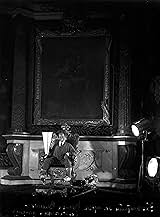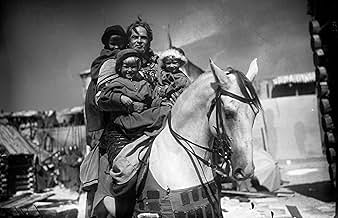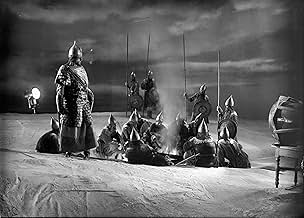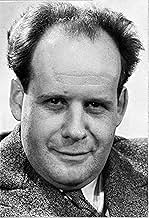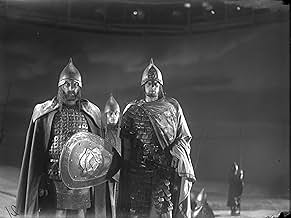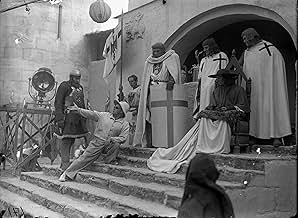AVALIAÇÃO DA IMDb
7,5/10
13 mil
SUA AVALIAÇÃO
A história de como um grande príncipe russo liderou um exército de motley para combater uma força invasora de Cavaleiros Teutônicos.A história de como um grande príncipe russo liderou um exército de motley para combater uma força invasora de Cavaleiros Teutônicos.A história de como um grande príncipe russo liderou um exército de motley para combater uma força invasora de Cavaleiros Teutônicos.
- Direção
- Roteiristas
- Artistas
- Prêmios
- 2 vitórias no total
Nikolay Cherkasov
- Aleksandr Nevsky
- (as N. Cherkasov)
Nikolai Okhlopkov
- Vasili Buslai
- (as N. Okhlopkov)
Andrei Abrikosov
- Gavrilo Oleksich
- (as A. Abrikosov)
Dmitriy Orlov
- Ignat - the Master Armorer
- (as D. Orlov)
Vasili Novikov
- Pavsha - Governor of Pskov
- (as V. Novikov)
Nikolai Arsky
- Domash Tverdislavich - a Novgorod Boyar
- (as N. Arsky)
Varvara Massalitinova
- Amelfa Timoferevna - Buslai's Mother
- (as V. Massalitova)
Valentina Ivashova
- Olga Danilovna - a Maid of Novgorod
- (as V. Ivashova)
Aleksandra Danilova
- Vasilisa - a Maid of Pskov
- (as A. Danilova)
Sergei Blinnikov
- Tverdilo - Traitorous Mayor of Pskov
- (as S. Blinnikov)
Ivan Lagutin
- Anani - a Monk
- (as I. Lagutin)
Lev Fenin
- The Archbishop
- (as L. Fenin)
Naum Rogozhin
- The Black-Hooded Monk
- (as N. Rogozhin)
Nikolai Aparin
- Mikhalka
- (não creditado)
Boris Belyakov
- Rytsar
- (não creditado)
A. Gulkovski
- Teutonic Knight
- (não creditado)
Avenir Gulkovskiy
- rytsar Tevtonskogo ordena
- (não creditado)
- Direção
- Roteiristas
- Elenco e equipe completos
- Produção, bilheteria e muito mais no IMDbPro
Avaliações em destaque
Eisenstein's "Alexander Nevsky" was made mostly for propaganda purposes in 1938. It was a reminder to all Russians of their dastardly neighbors (the Nazis) to their west. The film plays on this comparison and several others to a lesser degree. The evil Germanic Teutonic Knights just happen to be of the Christian faith and their religious leaders make for very effective villians. Although Nikolai Cherkasov as Nevsky and Nikolai Okhlopkov as his right-hand man, Vasili, are commanding in their roles, this movie is mainly noted for the final climactic battle between good (the Russians) and pure evil (the Germans). Eisenstein purposely covers the Germans with over-sized helmets so that they're totally devoid of any human facial expressions. On the contrary, the Russian peasants who comprise most of Nevsky's army are portrayed with a variety of emotions and their humanity is not only recognizable but refreshing and appealing to the viewer. When the Teutonic Knights make their charge on the Russian position, the action is fast and furious and it would be difficult to find any other film which stages its action scenes as well as Eisenstein does here. Although a bit dated in the print that I saw (the sound was certainly a bit off) this movie is a must-see for anyone interested in foreign films and especially the Russian cinema during the days of Stalin. The Germans might have thought twice about attacking Russia in 1941 if they had seen this film beforehand. The message was clear back then. In the words of Alexander Nevsky himself: "Do not enter Russia with a sword in your hand." Well, you can't say they weren't warned.
Sergei Eisenstein's "Alexander Nevsky" is a biopic of the famous prince, but when released it was seen as an expression of the growing suspicion of Nazi Germany. Indeed, the battle scenes make the Teutonic Knights - aka the Germans - get depicted as faceless goons who have no qualms about killing anyone. The epic battle scene is probably the most well remembered scene in the movie. It basically says "If you invade Russia, expect the same fate as befell the Teutonic Knights." Hitler didn't heed the warning, and his hoped-for thousand-year Reich only lasted twelve years (the harsh winters didn't help matters).
Understanding that it's a form of propaganda, it's an impressive movie. I wouldn't expect otherwise from Eisenstein. If you're going to teach a course on Russian cinema, you would have to include this one. Excellent movie.
Understanding that it's a form of propaganda, it's an impressive movie. I wouldn't expect otherwise from Eisenstein. If you're going to teach a course on Russian cinema, you would have to include this one. Excellent movie.
I think it's a superb cinematography experience, once again Einsenstein goes beyond the conventional visual elements of the movies, lets take an example, we are used to see the white color as a sign of purity, and the black color as the "bad" element. Here this visual elements are twisted, showing the enemy in white and the russians in dark uniforms. Certainly there is a propaganda tone in the whole story, but it's quite comprehensible for the time (previous to WWII) and the country. There is another element for which this movie is so touching, the excellent music by Serge Prokofiev, and specially the part of the battle. Alexander Nevsky is very much worth seeing not seeking for a conventional war movie, but as an alternative way of cinematic expression.
Alexander Nevsky (1938) is a brilliant piece of cinematic propaganda. The people of Russia are threatened by two major enemies, the Mongols and the Teutonic Knights of the Holy Roman Empire. In ordered to unite the warring, rival Princes in the Russian Realm, Nevsky takes charge and fights the lesser of two evils (The Teutonics). This influential film was copied many times over and it still holds up to this day. The soundtrack by composer Prokiev and Eisentstein's direction are a sight and sound to behold Many years later, John Milius used many of the movies scenes, set pieces and costumes from this film and incorporated them into Conan.
One of my favorite lines from Conan was taken from this movie. "It's not the strength of the iron in a weapon but the strength of the person that wields it is what matters." The comparisons are unmistakable. The armor that James Earl Jones and the Leader of the Teutonic Knights wear are virtually identical. A true tribute paid from one director to another.
I give Alexander Nevsky one of my highest recommendations. The movie plays like the final Act of Richard III. The presence of Prince Alexander on the screen is truly amazing.
One of my favorite lines from Conan was taken from this movie. "It's not the strength of the iron in a weapon but the strength of the person that wields it is what matters." The comparisons are unmistakable. The armor that James Earl Jones and the Leader of the Teutonic Knights wear are virtually identical. A true tribute paid from one director to another.
I give Alexander Nevsky one of my highest recommendations. The movie plays like the final Act of Richard III. The presence of Prince Alexander on the screen is truly amazing.
At school I was taught how some shots were called and there were two directors constantly mentioned : Orson Welles and Sergei M. Eisenstein. I didn't care that much then (I was a kid!) but now I know why, Eisenstein is a genius and it is a shame to see what was possible in 1938 where as almost more than a half century we're stuck with countless blank movies! Some say this movie isn't worth the genius of Eisenstein (then they have to watch it over and over till they can say anything bad) or even worse that it is just some propagandamovie for the Russians. Let's say it as it is, it is indeed pure propaganda for patriotism but isn't "Saving private Ryan" or "The longest day" so? I could sum up so many movies in where America is being raised to the top so why not Russia, and besides every war is fought for itrs patriotism why else would they raise flags? Aleksandr Nevsky is a must for anyone who cares about cinematography as almost every shot is a sublime picture. Perhaps it's all overseen but I am in wonder why this isn't included in IMDB's Top 250 where as there is so many overrated Oscarcrap in it as well.
Você sabia?
- CuriosidadesJoseph Stalin wanted this film to be a propaganda tool to warn Soviet citizens to be wary of German aggression. However, it was rejected at first due to it being "too anti-German", as it came out shortly before the Soviet-German non-aggression pact of 1939 was signed. In 1941, the peace was broken and Stalin reportedly demanded that it be shown in every Soviet movie theater as a rallying cry against the invasion.
- Erros de gravaçãoGavrila Alexich, one of the movie's main protagonists, could not participate in the Battle of Ice. He was killed one year before it, in 1241, storming the fortress of Koporye.
- Citações
Alexandr Nevsky: Go tell all in foreign lands that Russia lives! Those who come to us in peace will be welcome as a guest. But those who come to us sword in hand will die by the sword! On that Russia stands and forever will we stand!
- Cenas durante ou pós-créditosBefore the word "End" appears Alexandr Nevsky's famous quote "But those who come to us sword in hand will die by the sword! On that Russia stands and forever will we stand!" appears on the screen, right after Nevsky said it in the movie.
- Versões alternativasA new edition appeared on video in 1995 with the entire Prokofiev score newly recorded in hi-fi stereo, using the same 1938 orchestrations and perfectly synchronized to the original 1938 dialogue and sound effects tracks, so that it is now possible to see and hear the film exactly as it always was, with the exception being that the music is now heard in hi-fi sound, rather than the tinny 1938 recording.
- ConexõesEdited into A Guerra dos Feiticeiros (1977)
Principais escolhas
Faça login para avaliar e ver a lista de recomendações personalizadas
- How long is Alexander Nevsky?Fornecido pela Alexa
Detalhes
Bilheteria
- Faturamento bruto mundial
- US$ 2.226
- Tempo de duração1 hora 52 minutos
- Cor
- Mixagem de som
- Proporção
- 1.37 : 1
Contribua para esta página
Sugerir uma alteração ou adicionar conteúdo ausente

Principal brecha
By what name was Cavaleiros de Ferro (1938) officially released in India in English?
Responda
